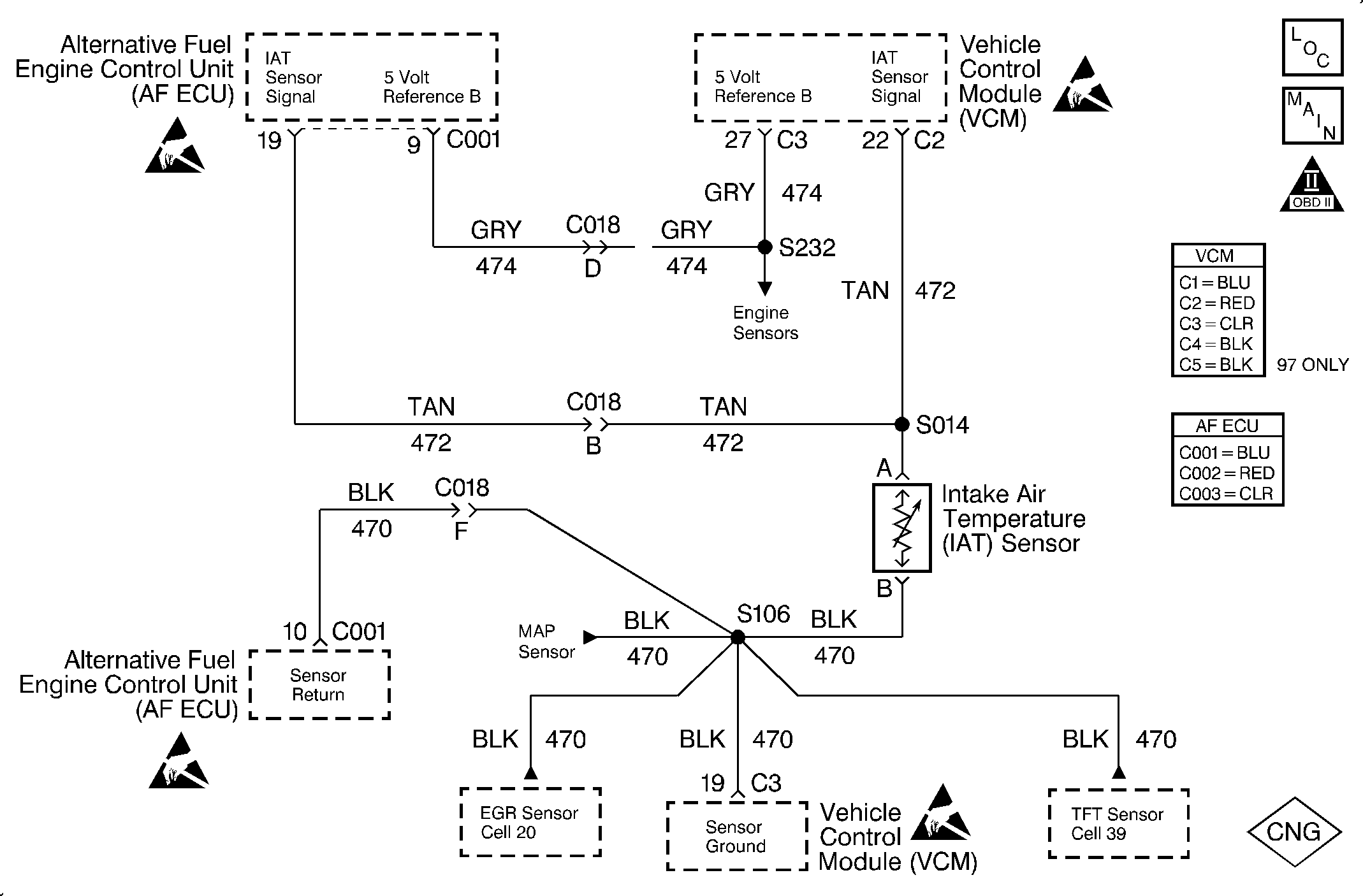
Circuit Description
The Intake Air Temperature (IAT) sensor is a thermistor located in the fresh air duct to the throttle body. It monitors the temperature of the air entering the throttle body. The VCM applies 5 volts to the sensor on a 5 volt reference circuit. Resistance in the sensor measures high when the air is cool and the ECU senses a high voltage signal. The sensor resistance measures low if the air is warm, and the ECU senses a low voltage signal.
This is a type B DTC.
Conditions for Setting the DTC
The following conditions will set the DTC:
| • | The vehicle is in the CNG operation mode. |
| • | Vehicle speed is greater than 2 mph. |
| • | Engine run time is greater than 100 seconds. |
| • | IAT voltage is below 0.019 volt. |
Action Taken When the DTC Sets
The ECU sets the DTC 23 after 2 consecutive driving trips with the fault active.
Conditions for Clearing the MIL/DTC
The ECU turns the MIL OFF after 3 consecutive driving trips without a fault condition present. A DTC will clear if no fault conditions have been detected for 40 warm-up cycles (coolant temperature has risen 40°C (72°F) from the start-up coolant temperature and the engine coolant temperature exceeds 70°C (160°F) during that same ignition cycle) or the code clearing procedure has been used.
Diagnostic Aids
Always diagnose ANY VCM codes that are present before beginning this diagnostic procedure.
A scan tool indicates the temperature of the ambient air entering the throttle body. The air temperature should read very close to the temperature of the outside air. The air temperature should rise gradually as the engine warms up and the underhood temperature increases. Check for poor connections at the ECU and IAT sensor by wiggling the connector gently and monitoring the IAT voltage on a DVOM connected to the ECU connector. Repair the connector if the voltage varies.
A sensor may also become skewed or mis-scaled. The Temperature vs. Resistance value table will help to detect a skewed sensor. Refer to Temperature vs. Resistance in Engine Controls - 5.0, 5.7L in the C/K Truck Service Manual.
Test Description
The number(s) below refer to the step number(s) on the diagnostic table.
Important: Use the same diagnostic test equipment for all of the measurements.
-
With the ECU connector disconnected and the voltage still present, this eliminates the ECU as the possible cause of the fault.
-
The conditions for the DTC are still present if the IAT sensor circuit voltage measures less than 0.019 volts. The problem is not intermittent.
Step | Action | Value(s) | Yes | No |
|---|---|---|---|---|
1 | Was the Alternative Fuels (AF) Powertrain On-Board Diagnostic (OBD) System Check performed? | -- | Go to Step 2 | Go to Alternative Fuels (AF) Powertrain On Board (OBD) System Check |
2 |
Is the IAT sensor voltage less than the specified value? | 0.82 V | Go to Step 3 | Go to Step 4 |
Disconnect ECU connector C001. Does the scan tool display an IAT sensor voltage less than the specified value? | 0.82 V | Go to Step 8 | Go to Step 6 | |
Using a DVOM, backprobe the IAT sensor signal in the ECU connector. Does the DVOM display the IAT sensor signal less than the specified value? | 0.019 V | Go to Step 5 | Go to Step 10 | |
5 |
Is there continuity? | -- | Go to Step 6 | Go to Step 11 |
6 | Inspect the ECU connector for loose, corroded or damaged pins. Was a problem found? | -- | Go to Step 11 | Go to Step 7 |
7 | Replace the ECU. Refer to Engine Control Unit Replacement . Is the action complete? | -- | Go to Step 15 | -- |
8 |
Is the IAT sensor voltage greater than the specified value? | 4.0 V | Go to Step 13 | Go to Step 9 |
9 |
Is the resistance at the specified value? | ∞ | Go to Step 14 | Go to Step 12 |
10 | The DTC is intermittent. If no additional DTCs are stored, refer to the Diagnostic Aids. If additional DTCs were stored, refer to those tables. Are any additional DTCs set? | -- | Go to the applicable DTC table | -- |
11 | Repair the circuit as necessary. Refer to Repair Procedures in Electrical Diagnosis in the C/K Truck Service Manual. Is the action complete? | -- | Go to Step 15 | -- |
12 | Repair the short to ground in the IAT signal circuit. Refer to Repair Procedures in Electrical Diagnosis in the C/K Truck Service Manual. Is the action complete? | -- | Go to Step 15 | -- |
13 | Replace the IAT Sensor. Refer to IAT Sensor Replacement in Engine Controls - 5.0, 5.7L in the C/K Truck Service Manual. Is the action complete? | -- | Go to Step 15 | -- |
14 | Replace the VCM. Important: Reprogram the VCM if it is faulty. Refer to VCM Replacement/Programming in Engine Controls - 5.0, 5.7L in the C/K Truck Service Manual. Is the action complete? | -- | Go to Step 15 | -- |
15 |
Does the diagnostic run and pass? | -- | Go to Step 16 | Go to Step 2 |
16 | Are any ECU or VCM DTCs displayed that have not been diagnosed? | -- | Go to the applicable DTC table | System OK |
